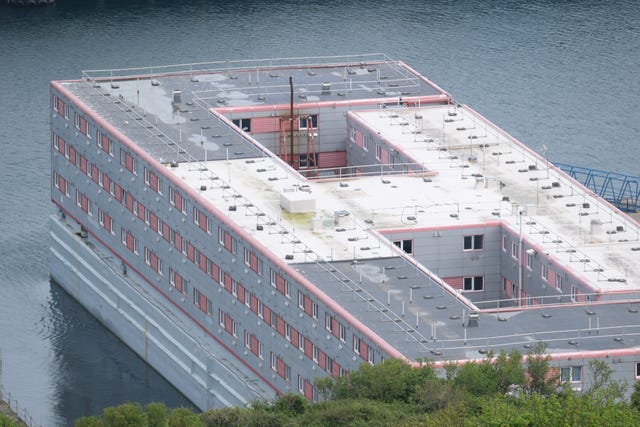Dorset resident loses legal challenge over Bibby Stockholm barge
Carralyn Parkes claimed that the council should have used its powers over the mooring of the boat in Portland Harbour.

A Dorset resident has lost a legal challenge over a council’s decision not to consider using its powers over the mooring of the Bibby Stockholm in waters off its coastline, a High Court judge has ruled.
Carralyn Parkes, the mayor of Portland, challenged Dorset Council’s decision in July 2023 not to consider using enforcement powers over the barge housing asylum seekers, which is moored in Portland Harbour.
Her lawyers told a hearing in February that she was “deeply concerned” about the 93-metre-long ship accommodating migrants and wanted a judge to order the council to reconsider its “erroneous” position.
The council argued that Ms Parkes’ case was “absurd and unworkable”, adding that “planning law simply doesn’t extend below the mean low water mark”.
In a judgment on Thursday, Mr Justice Holgate dismissed Ms Parkes’ bid, ruling that the seabed above which the Bibby Stockholm is moored could not be viewed as “land” over which the council had planning control.
He said: “Neither the area of the sea bed above which the Bibby Stockholm is moored, nor Portland inner harbour, nor the ‘inner waters’ in Weymouth bay extending to the baselines of the territorial sea, form part of the area of Dorset Council.”
He continued: “Indeed, if land were to be treated as including the sea bed, there would be no logical stopping place before the limits of this country’s territorial sovereignty are reached.
“That approach would be inconsistent with the legislature’s intention to enact a system of development control in relation to the land, not the sea.
“It is logical to include the foreshore within the area referred to as “land” because it is not always covered by the sea.”

Speaking outside court earlier this year, Ms Parkes, who brought the legal action in a personal capacity, said she was convinced that if the council had consulted on planning permission for the barge it would have concluded that its location was unsuitable.
But lawyers for the council said that “the seabed over which the Bibby Stockholm floats is not ‘land’”, adding that Ms Parkes’s barristers had failed to show that Portland Harbour comes within the boundaries of Dorset.
The Home Office and Department for Levelling Up, Housing and Communities, took part in the hearing as interested parties and backed the council’s position, arguing the case should be dismissed.
The decision marks a second High Court defeat for Ms Parkes over the Bibby Stockholm’s use.
In October last year, the same judge ruled that she could not bring a challenge against the Home Office over the lawfulness of its decision to house migrants on the barge.
The 222-room, three-storied ship was towed into the harbour and moored to a “finger pier” in July last year after the Government announced it would be used to house asylum seekers for at least 18 months.
The barge has since been hit by problems, delays and disputes, including the discovery of dangerous bacteria last summer that led to an evacuation, with it lying vacant for two months.
In January, it was reported that the Home Office had shelved plans to procure more barges to hold asylum seekers amid struggles to find ports willing to take them.
Earlier this month, three people were charged with obstruction of the highway after protesters blocked a coach taking migrants from a hotel to the barge.




